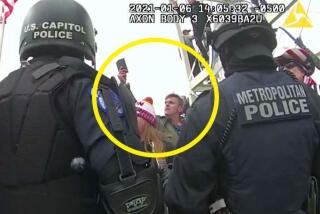O.C. BUSINESS PLUS : Ex-Chairman of Statek Is Sentenced for Trying to Have Former Colleagues Killed : Crime: Prosecutors in London say he hired hit men to ‘eliminate’ his former associates.
- Share via
The former chairman of an Orange-based electronics company was sentenced to six years in prison Thursday after being convicted in London of hiring hit men to kill former business associates.
The evidence against Hans Frederick Johnston, 72, of Stamford, Conn., included a letter he had written, admitting he had decided to “eliminate” his former associates.
After deliberating just one hour, a jury at the Old Bailey criminal court convicted Johnston of solicitation to murder and using false documents.
Judge Richard Hutchinson told Johnston the prison sentence would have been longer, but he took the defendant’s age and poor health into consideration.
“You have thrown away your life and good character and engaged with people you have every reason to believe were sinister and violent in pursuing your obsession,” the judge said. “You are not even now repentant.”
Johnston was taken back to London’s Belmarsh prison. Hutchinson also recommended that Johnston, who will be eligible for parole in three years, be deported when he is released.
He was facing bankruptcy and wanted revenge after losing control of Statek Corp. in Orange, said prosecuting attorney John Kelsey-Fry.
Johnston denied soliciting Louis Keats to murder former partner Miklos Vendel and a company director, Margaritha Werren, between November 1997 and April 1998. No attempt on their lives was actually made.
Johnston was chairman of Technicorp International II Inc., the holding company that owns Statek Corp., until he was ousted by Vendel in 1996. Statek manufactures quartz crystals and oscillators, primarily used for timing devices with medical applications.
Their dispute resulted in a series of civil suits, including cases in Delaware, which Johnston lost.
Police arrested Johnston in April 1998 after receiving a tip from an undisclosed source. In the course of their investigation, they found an incriminating letter that Johnston had left with his landlady in London.
Keats introduced Johnston to a group of men “said to be part of an organization based in Dublin,” the prosecution said. The initial contract agreed to was $160,000 and half was delivered in cash, the prosecution said.
Charges against Keats were dropped in September 1998 because of insufficient evidence, the Crown Prosecution Service said.
Johnston agreed that the Irish men should share in the money, but he feared being betrayed, Kelsey-Fry said.
“Because of that he then made a fatal error. He decided to write down what he had done--a confession--put it in a sealed envelope and give it to a friend for safekeeping,” Kelsey-Fry said.
In that statement, Johnson accused Vendel and Werren of manufacturing evidence that had caused him massive losses.
“I therefore decided to be certain that Vendel and Werren would not be able to enjoy the fruits of their thefts and to eliminate both individuals,” Johnston’s statement said.
Johnston denied that he ever intended to hurt anyone. He has not decided whether to appeal, according to his attorney, Anthony Burton.
*
Janet Stobart of The Times’ London bureau contributed to this report.
More to Read
Inside the business of entertainment
The Wide Shot brings you news, analysis and insights on everything from streaming wars to production — and what it all means for the future.
You may occasionally receive promotional content from the Los Angeles Times.










